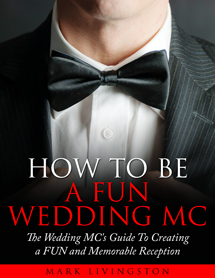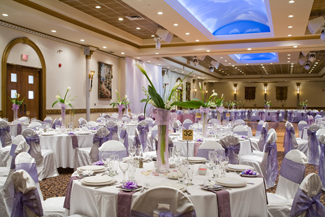While being asked to be the MC at a wedding can be a huge honor, it also carries with it a lot of responsibility…and, to many inexperienced emcees, some trepidation because of the fear of the unknown.
For many people – especially the first time or inexperienced MC – it can not only be confusing but also a very stressful and nerve-wracking time.
Apart from the normal fear of speaking in front of hundreds of guests that many people experience, it’s a role that most people aren’t familiar with.
That’s why I’ve put together these 10 tips and ideas to help the novice Wedding MC with his or her duties and responsibilities:
1. Have An Initial Meeting With The Wedding Planners
Your role starts almost as soon as you’re asked to be the Master of Ceremonies even though most people think your duties take place once you stand up and direct the reception.
Sit down with the bride and groom and the planner well before the day of the wedding – at least two weeks, but preferably several weeks, before.
The initial meeting with the bride and groom and planner (if there is one) is the time when you gather information about what’s going to happen at the reception and what’s expected of you.
In most cases the bride and groom and their planner will know what they want but will leave the implementation of the details to you. That’s your role as MC.
At the very least, in your initial meeting you’ll want to know:
1. What’s expected of you and what duties you’ll perform
2. Who the key players are
3. What announcements will be made
4. What introductions will be made
5. What events will take place and when they will take place
Sometimes traditions or rituals will be followed as they have been for centuries. Other times they will be excluded. And sometimes they might be included but with a twist or variation.
The bride and groom might, for example, create their own version of the Grand Entrance or introductions of the wedding party.
Or they might dispense with the formal receiving line but include a cocktail hour where drinks are served in an adjoining room before guests go to the reception room.
If there is a cocktail hour, it’s the perfect opportunity to introduce yourself to guests who play a role at the reception, usually giving a speech or toast.
During the planning stages you might be asked for advice or you’ll make suggestions for events such as wedding games or activities.
There’s a huge amount of preparation you need to do before the reception including preparing an agenda, knowing the names of special guests and key players, preparing introductions, and even organizing wedding games and activities.
2. Prepare A Detailed Agenda
The agenda (or run sheet) is your reception “playbook.” It’s the Wedding Master of Ceremonies outline used by the emcee at a reception.
The agenda includes the events and their sequence at the reception and should include virtually everything that will take place during the reception..
A very basic agenda – depending on the type of reception and the time allotted – will usually include:
> Cocktail reception or receiving line
> Wedding party introduction
> Grand Entrance
> Main Meal
> Speeches and toasts
> Traditional events
> Final Farewell
The agenda is flexible and the sequence for some events can be changed according to the bride and groom’s wishes.
Your agenda can be as detailed as you need and it’s advisable to create a binder or use a hand held electronic device for quick reference.
Your agenda will include names of the bridal or wedding party, names of guests who will be giving speeches and toasts, all of the events that will take place, approximate times the events will start, and any other information including games, activities, and entertainment.
A reception normally will include traditional events like wedding speeches and toasts, guest activities, cake cutting, garter toss, bouquet toss, dancing, and the final farewell although this is entirely flexible and will depend on the bride and groom’s wishes.
You will need to know when the speeches and toasts will take place and who will be making them. You’ll also want to know if there will be an open mic.
While it’s a tradition, keep in mind that not every bride wants to throw her bouquet or have her garter taken off. As well, not every bride wants to give a speech. These are things you need to know as you plan the agenda.
3. Understand What Your Role Is
Your role is to oversee the reception, ensure events flow smoothly, and to keep the atmosphere fun and celebratory.
Most importantly, you’re not the entertainment and you’re not expected to do a “routine” to amuse the guests even if you fancy yourself to be a bit of an entertainer or comedian.
In fact, a reception can be a resounding success without a single marriage or wedding joke or one-liner from the Master of Ceremonies.
Understanding your role can help avoid awkward moments.
There’s nothing more embarrassing than discovering you didn’t do something that the newlyweds or their parents expected you to do.
That’s why it’s important that you know your duties and responsibilities from the outset so you can plan accordingly.
4. Arrive At The Reception Venue Early
It’s never a good sign if you rush in at the last minute and guests see that you’re in a panic. Even worse if you saunter in while everyone is frantically looking for you or wondering where you are.
The reception is an important event and people are relying on you.
You have duties to perform before the reception gets into full swing on the newlywed’s big day.
If you’re attending the ceremony, make sure you have plenty of time to arrive at the reception venue, allowing for any unexpected delays including traffic delays.
In fact, if it’s possible, visit the reception room a few days before the day of the wedding.
The bride has already made arrangements with the venue manager for the placement of tables and where the dance floor, DJ or band, cake table, and buffet (if it’s not a sit down meal) will be.
Viewing the venue a few days before the wedding or arriving at the venue early will help you familiarize yourself with the layout of the room and the location of audio equipment.
Arriving early on the “day of” will also give you time to meet with key players: the venue manager, the caterer, the DJ or the band, the photographer and/or videographer, and any guests who are giving wedding speeches and toasts.
5. Follow Your Agenda or Run Sheet And Make Any Timing Adjustments Where Necessary
It’s unrealistic to think that everything will run like clockwork.
Delays happen.
The bride and groom run late after the ceremony.
The caterer is behind serving the meal.
The wedding party arrives late.
These and other unexpected surprises can throw off the timing of the reception – sometimes significantly. And that can have an impact on the scheduling of events that are planned.
It will mean being flexible and making adjustments to your original plans.
This is where preparation, poise, and confidence are essential.
Make sure you can fill in any gaps in the events. There’s nothing worse than having restless and bored guests wondering what’s happening and not enjoying themselves.
Best way to keep the guests entertained? Have extra wedding games or guest activities on hand in case they’re needed.
On the other hand, if time is short – which can happen just as easily – be prepared to eliminate or shorten parts of the program or combine them.
For example, if open mic was planned for the speeches, cut that segment short or eliminate it altogether. Open mic can be time consuming as people ramble on and “wax poetic.”
Eliminating this segment in the speeches and toasts event will have little or no effect on the fun atmosphere. In fact, it can be a relief to guests who find speeches for the most part boring.
6. Keep Your Key Players Informed
The key players will rely on you for direction so they can perform their duties.
The caterer needs to know when to serve the meal and whether things are running early, on time, or late.
The photographer or videographer needs to know when events are taking place so they can position themselves and take photos or shoot video.
Entertainers need to know when they will be required and where they can set up if they have props as part of their act.
The DJ (or band leader if there’s a live band) has to know when to prepare to ramp things up with music.
5. Be Well Prepared
Nobody will know you’re an inexperienced Wedding MC when you carry out your duties professionally.
In fact, if you’re well prepared, people will not only be impressed but will also assume you’re a professional emcee.
On the other hand, an unprepared MC shows his or her inexperience quickly: There will be lengthy lulls between events and a general sense of disorganization or confusion.
That’s why it’s important to have your agenda, timeline, and MC scripts prepared in detail.
Know your timeline and schedule so things run on time. Plan for delays. Make adjustments where necessary. The reception room is available for only so many hours so you’ll have to make sure that key events have an appropriate amount of time allotted to them.
7. Your Wedding MC Speech Will Be Different From That Of Other Guests
Many times there’s confusion about the Wedding MC speech.
Generally, it’s not a tribute to the bride and groom like the other speeches.
Instead, it’s more appropriately called a “welcome” speech that the Master of Ceremonies gives to the guests before the bride and groom’s Grand Entrance.
This is where you will welcome the guests, tell them what’s planned, and make announcements.
Announcements can include specific requests from the bride and groom (such as whether or not they want the clinking of glasses), where facilities are located (bar, restrooms, smoking area), the location of the gift table or guest book, and events that will take place during and after the reception.
Your welcome speech takes place before introducing the bridal (or wedding) party and the newlyweds.
Occasionally the newlyweds will ask the emcee to give a wedding speech. In this case, it will include a speech followed by a toast.
Other times, the MC might stand in for someone who couldn’t make it to the reception or give a special toast to acknowledge someone’s significant contribution to the planning.
8. Be Diplomatic, Gracious, and Helpful
The newlyweds will depend on you to oversee the reception so that they can focus on their guests.
Other people are depending on you as well.
And they want the reception to be a success just as much as you do.
You’ll be dealing with members of the wedding or bridal party, guests, speakers, honored guests, dignitaries, parents and close relatives of the newlyweds, the venue manager and staff, as well as support people including the caterer, photographer, DJ or musicians, entertainers, bar staff, and others.
Everyone will consider you to be the “go to” person for direction and help.
Your role is to see that people who are relying on you are properly introduced or acknowledged or that they are supported in their contribution to the reception.
9. Focus On The Newlyweds
The bride and groom are the guests of honor and should be the focal point of key events.
Your role is to shine the spotlight on the newlyweds instead of stealing the limelight from them.
Keep in mind that you’re not the entertainment and you’re not expected to do a “routine” to amuse the guests even if you fancy yourself to be a bit of an entertainer or comedian.
Be especially careful not to say things that embarrass the bride or groom or their families or guests.
10. Create A FUN Reception
The decorations are gorgeous.
The meal is delicious.
The cake is magnificent and tasty.
The guests will notice how elegant or rustic the reception room is.
They’ll remark on how pretty the bride is.
And they’ll comment on the meal and the dessert.
In the end, though, people will remember how much fun they had.
Because the guests are at the reception to celebrate and have fun, not just have a “nice time.”
Your role is to turn the marriage into a celebration.
That’s the role virtually no-one tells you about…or shows you how to do.
These tips will give you an idea of what’s expected if you’re the MC at a wedding.
There’s no denying that the Wedding MC’s role is challenging. But with proper preparation and attention to detail it can not only be rewarding but can also lead to lasting memories for the bride and groom.
For the novice Wedding MC who wants to plan a FUN reception, there’s a very useful guide called How To Be A FUN Wedding MC.
It has Wedding MC ideas for games (both indoor and outdoor and for children) and guest activities and entertainment (to create a fun atmosphere) and also includes sample wedding agendas or runsheets (so you can create an outline of the reception), MC scripts (so you know what to say), the Order of Wedding Speeches and Toasts (to help you plan one of the most common traditional events), and much more to help an emcee create a fun and exciting time for the bride and groom and their guests.

 How to plan a fun reception
How to plan a fun reception Most importantly, you’ll need IDEAS on how to make the wedding reception a celebration.
Most importantly, you’ll need IDEAS on how to make the wedding reception a celebration.


